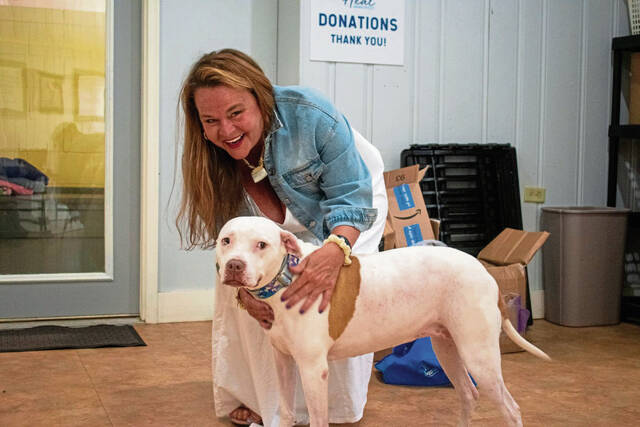https://mirror.triblive.com/local/westmoreland/home-again-new-heal-animal-rescue-executive-director-vows-to-expand-help-for-local-animals/
‘Home again’: New Heal Animal Rescue executive director vows to expand help for local animals

When Mary Withrow began working as Heal Animal Rescue’s new executive director last week, it felt like she was “home again.”
Heal is a no-kill animal adoption center and sanctuary nonprofit, with a shelter in Youngwood and an animal sanctuary in Latrobe.
Withrow, 60, of Pittsburgh has a history of working at animal shelters, but time has passed since she last was in what she calls the “shelter world.”
“I really missed it,” Withrow said. “I’m really looking forward to helping the community a little bit more … and (getting) animals into good homes who have been here for a while.”
Before coming to Heal, Withrow worked for the Animal Rescue League and Western Pennsylvania Humane Society, consecutively, before they merged to become Humane Animal Rescue of Pittsburgh.
During that time, Withrow said, she also was on the cruelty prevention team for the Humane Society of the United States.
She then became executive director of the Pittsburgh Aviation Animal Rescue Team, which now is known as No Dog Left Behind.
Withrow said she also has worked to pass animal cruelty-related legislation across the state and region, and she has traveled throughout the country on dog fighting raids.
In 2014, Withrow first approached a councilperson in Pittsburgh regarding an outside dog ordinance because the city didn’t have one. Though the ordinance she proposed didn’t pass statewide, it passed unanimously in Pittsburgh, Withrow said.
She later proposed “animals in distress” legislation, or what people call the “hot dog law,” and it was passed at the local and state levels, Withrow said.
“Even if animal control was called to get an animal out of the car, they couldn’t do anything because they wouldn’t have immunity,” Withrow said of the possibility of breaking car windows to retrieve animals.
She is working to support a dog licensing fee increase and a fireworks change to “create a little more distance and make things a little safer.”
Withrow got the job after former Executive Director Kelli Brisbane stepped down when she was hired as director of partnership development at Go Laurel Highlands.
The new job will offer Brisbane “the flexibility to be with her family more,” said Gabi Kostley, adoption coordinator at Heal.
At Heal, everyone’s been “really welcoming,” Withrow said.
“It’s so great to see that (the employees and volunteers) all know so much about each and every animal … they really, really care,” Withrow said.
Bethany Morse, 36, animal care and adoption manager at Heal, is a longtime employee who has been with the shelter since 2012.
“Seeing the progression that the animals take during their time here with us” is the best part of her job, said Morse, of Elizabeth.
Many animals coming into the shelter and sanctuary were either neglected or abandoned, and “a lot of them are scared” when they arrive, Morse said.
“Through lots of patience and love during their time here, we help them to come out of that shyness,” Morse said.
Adoption levels have fluctuated over the years, but recently, there has been an influx of animals coming into shelters and not enough adoptions to keep up, she said.
Heal can house up to 30 dogs and 35 to 40 cats, Morse said, and oftentimes there’s a waitlist.
“We’re a no-kill shelter, so we only take in what we can house,” Morse said. “As soon as a pen opens up (after) an animal has gotten adopted, we revert back to the waitlist.”
Primarily, animals are brought to the shelter because owners are moving to a different area, Morse said. But financial reasons and lifestyle changes often are cited as well.
Morse said operations have come a long way since Candy Valentino founded the shelter, which previously was called Animal Friends of Westmoreland, in 2006.
“When I first started, we actually didn’t have a front door,” Morse said. “Everybody entered the shelter … through the back door and came in through the dog kennel.”
Related:• Animal Friends of Westmoreland has new name • New partnership development director brings ‘exuberance’ to Go Laurel Highlands
Over time, the shelter was joined by a separate 62-acre sanctuary, a farm that is home to cows, sheep, ducks, chickens, pigs, goats, mini-mules, a rooster and a cat — and all are former survivors of neglect and abuse.
And the name change, Morse said, was to broaden Heal’s reach outside Westmoreland County and the Pittsburgh area.
“When you have a location attached to a name, you can kind of limit yourself to even donations,” Withrow said.
Kostley of Greensburg said the name change allows the shelter and sanctuary to expand nationally and differentiate itself from Animal Friends of Pittsburgh.
“(We) thought it would be best to switch to a name that kind of generalized it,” she said. “It allows us more flexibility in terms of how we want to grow.”
Now that she is at the helm, Withrow hopes to grow Heal by expanding the shelter’s building or purchasing a new one. She also is thinking about moving the shelter and farm to the same location eventually.
“The more animals that we get adopted here at the adoption center, the more that we can then bring in and take care of and find a new forever home for them as well,” Morse said.
Though Heal cares for previously abused and neglected animals, Withrow said animals actually “help people the most.” Her love for helping animals stemmed from loss.
Withrow said she occasionally volunteered at a shelter before her partner died in an accident.
“I was having a really hard time … and my grief counselor said, ‘You know, if you’re ever gonna get better, you should try going outside of yourself and helping someone or something else,’ ” Withrow said.
She decided to become more involved — so much so that it has become her passion.
“I owe it to the animals for bringing me out of a dark place,” Withrow said. “To work within your passion is really a great gift.”
Copyright ©2026— Trib Total Media, LLC (TribLIVE.com)
